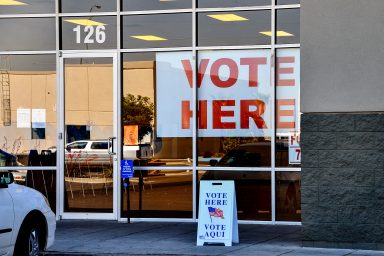US District Judge Mark Walker issued a preliminary injunction blocking two provisions of a new Florida election law.
|
Listen To This Story
|
Sometimes, when studying a court decision, one has to read the entire document to know who won and why. That was not necessary in the case of US District Judge Mark Walker’s scathing ruling that blocked two provisions of a new Florida election law Monday. Here, the outcome was apparent after the very first sentence.
“This case arises from Florida’s latest assault on the right to vote,” Walker wrote in granting a preliminary injunction in the case.
It went downhill for Florida Gov. Ron DeSantis and GOP lawmakers, who had tried to give themselves an edge by making it more difficult for third parties to register and help people to vote.
“Florida may, of course, regulate elections, including the voter registration process. Here, however, the challenged provisions exemplify something Florida has struggled with in recent years; namely, governing within the bounds set by the United States Constitution,” Walker wrote.
One of the provisions would have prohibited noncitizens from registering citizens to vote, and the other was a vague prohibition of retaining the personal information of voters.
In great detail, Walker explains why they are unconstitutional and why the plaintiffs, which include individuals and civil rights groups, stand to prevail once the court makes a permanent ruling.
He notes that there is no sound justification for barring noncitizens, including permanent residents, from helping organizations register Floridians to vote.
With regard to the second provision, Walker points out that Florida Republicans had “drafted a criminal statute that contemplates some individuals retaining some information for some undefined purpose. The penalties for running afoul of these illusory standards include arrest, prosecution, and ultimately a felony conviction.”
In recent years, Sunshine State Republicans have repeatedly tried to put their thumbs on the scale when it comes to election laws. Most famously, they have subverted the will of voters by continuing to make it difficult for former felons to vote.
In his ruling, Walker hints at these many attempts at subverting democracy.
“The State of Florida is correct to seek integrity in our electoral system. Sound election laws ensure the people are heard without distortion from negligent and bad-faith actors,” Walker, who once said Florida had become the “laughingstock of the world” for its inability to run better elections, wrote. “Here, however, Florida’s solutions for preserving election integrity are too far removed from the problems it has put forward as justifications.”
Voting rights organizations applauded the decision.
“Today’s ruling confirms what we knew from the very beginning: Florida’s latest voter registration law was unconstitutional and served no other purpose than to silence our communities,” said Frankie Miranda, president and CEO of Hispanic Federation. “This ruling is a win for all Floridians — especially for underrepresented communities who rely on nonpartisan organizations like us to help make their voices heard.”




